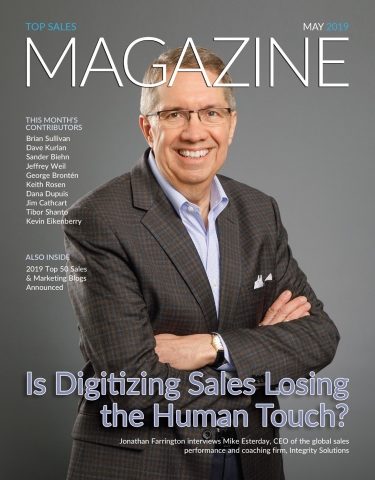Is Digitizing Sales Losing the Human Touch?
Originally published in Top Sales Magazine.
Jonathan Farrington interviews Mike Esterday, CEO of Integrity Solutions, on the current state of digitizing sales and the critical role of coaching and creating a human touch.
Most of us would agree: Sales is more complex today than ever. But what’s causing all the complexity and how can sales teams excel in this environment?
JF: So, Mike, in your view, why is sales so complex today and how can sales teams be successful?
ME: Everything’s more complex in selling — there are lots more customer touch points, buyers have more data at their fingertips — in fact, they often know more about what they’re buying than the salesperson does. Complexity also is driven by the rise of decision makers. Instead of purchasing teams, we’re seeing purchasing armies. Bottom line: There are more people involved in the decision; buyers know more about you; and people are changing jobs more often, so higher turnover rates means decision makers are changing more often, lengthening the sales cycle.
JF: What about the technology component as a driver too?
ME: Yes, technology’s influence is huge. And the over-emphasis on technology for dealing with complexity is a big deal. Recently, I was at a conference of inside sales professionals where most of the presentations and vendors were focused on the latest tech — this or that app to handle this or that function. And AI is coming on strong. There’s a term being bandied about for this emphasis on tech: digitizing sales.
JF: What’s your bottom line on the tech innovations and all this complexity?
ME: Technology is great, no doubt about it. And we’re seeing tools and apps that help salespeople in so many ways. But nothing beats the human touch –and, specifically, the quality of our conversations. Most organizations are only focused on one of the three critical conversations that will help them achieve their numbers this year.
JF: Let’s walk through each of the three critical conversations.
ME: The first is the most obvious – the conversation with the customer. This involves the salesperson’s skillset– territory management, product knowledge and selling skills. These are foundational. The second conversation is the one salespeople have with themselves. This one is even more important and takes place dozens of times a day –way more than, say, conversations we’re having with customers. This is about mindset– the self-talk we all have about who I can call on, how successful I deserve to be and the types of goals I set. We call this Achievement Drive. It’s about beliefs, values, purpose, the drive to achieve and push through obstacles. The second conversation is the one that’s often overlooked in most training and coaching initiatives. The third conversation is the one salespeople have with their coach. Is there a trust environment to talk about real issues? Are discussions only about numbers and details or does the coach have the ability to truly develop people, seeing more in them than the salesperson sees in his or herself?
JF: What have you learned from your research about coaching?
ME: We conducted a research study with the Sales Management Association of global sales leaders and the results surprised us. Most sales organizations recognize that coaching is critical today – in fact,76% of those we surveyed said so. But roughly the same number said they don’t do much of it. What’s more: Few organizations have a shared definition of what coaching is or isn’t, so managers do whatever comes naturally. Coaching conversations around mindset are rare, which presents a huge opportunity for many organizations.
JF: Tell what you think what is the best way to improve the conversation between coach and sales rep?
ME: Today, we see many sales and coaching processes that are way overengineered. They often look good on paper and sound comprehensive, but they’re just too complex for managers to execute. As such, managers tend to find that they are, not surprisingly, “too busy” to coach their people. But it’s not a time issue – it’s a skill and confidence issue. Keep it simple, agile and managers will embrace it.
JF: How does Integrity Solutions address the mindset piece?
ME: For the past 50 years, we’ve believed that a salesperson’s ability to sell is much more an issue of who they are than what they know. People’s inner values and beliefs control sales success. Achievement Drive is the multiplier of success. In addition to building world class selling skills, effective training must also address the root cause of what may be holding back sales performance.These are more internal issues such as a salesperson’s view of selling, view of their abilities, view of possibilities, values, commitment to activities and belief in product. One or more of these may be the underlying cause, the real reason for low performance. These deeper challenges can explain a vexing phenomenon that everyone in sales management has experienced. You hire two people with similar skills, background, experience, and they are given similar territories, prospect lists and opportunities. One of the two becomes very successful and the other one never gets out of second gear. Why does this continue to happen? The reason is clear: Until you proactively address all three of these conversations, you can give reps all of the training, tools and technology in the world and you will be ultimately frustrated with the results. We create development processes that address all three of these components by incorporating the critical elements necessary for performance change– repetition, reinforcement, accountability, coaching and – most importantly – time-spaced learning.
JF: Mike, thanks for these insights. Any final thoughts?
ME: Technology, product knowledge and selling skills are all givens in today’s world. At the same time, sales success is truly an inner game. To reach the highest levels of success, you must address not just how, but also why they sell to unlock the potential that resides inside each of your salespeople.


